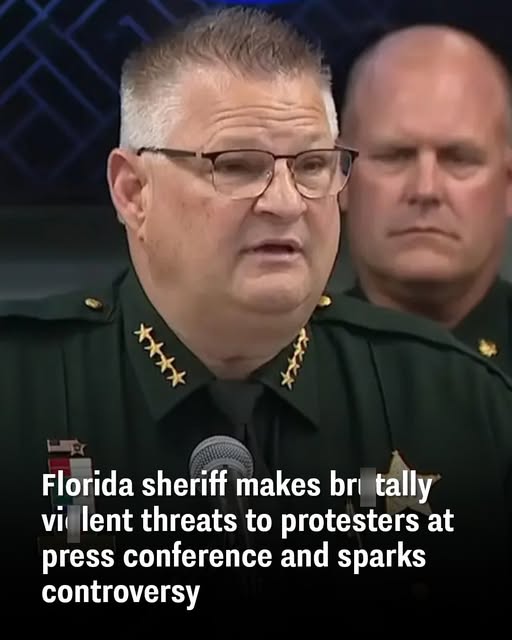Florida Sheriff Wayne Ivey has ignited a firestorm of controversy after delivering an alarming and aggressive message to protesters during a recent press conference. Speaking in response to planned demonstrations against ICE immigration enforcement, Ivey issued a series of blunt and violent warnings, stating that any protester who threw objects, blocked roadways, or posed a threat to law enforcement would face severe repercussions — including arrests, injuries inflicted by police dogs, and even lethal force.
“If you attack our deputies,” Ivey declared, “we will kill you. Graveyard dead.” His unapologetic language shocked many and instantly went viral, drawing both fierce criticism and vocal support across social media.
The sheriff’s comments come at a time of escalating national protests surrounding immigration enforcement. Demonstrations have been planned in various cities across the country, with some intentionally scheduled to coincide with former President Donald Trump’s birthday celebrations. Tensions remain high as activists continue to challenge federal and local actions involving ICE raids, deportations, and detention policies.
Sheriff Ivey, who serves in Brevard County, Florida, is no stranger to controversy. He has previously stirred headlines for mocking suspects arrested during drug busts, often sharing sarcastic commentary on social media. However, his past has not been without error — he once faced legal backlash for publicly misidentifying an innocent person during a fugitive roundup campaign, leading to a lawsuit and public outcry.
His most recent statement marks one of his most extreme stances yet, intensifying the debate over how law enforcement should handle civil protests, especially those surrounding politically charged issues like immigration. Critics argue that his rhetoric is inflammatory and encourages unnecessary violence, while supporters claim he’s simply being honest about protecting officers and upholding the law.
Recent protests in cities like Los Angeles have further highlighted the deepening rift between law enforcement and immigrant rights groups. Videos from those events show tense standoffs between demonstrators and police, with many warning that the nation is headed toward an increasingly hostile climate for peaceful assembly and dissent.
As the controversy surrounding Sheriff Ivey grows, civil rights advocates, lawmakers, and legal experts are weighing in, questioning whether such public threats from law enforcement figures cross the line between safety and suppression. Regardless of where the public lands on the issue, one thing is certain: the sheriff’s words have struck a nerve — and the nation is paying attention.
